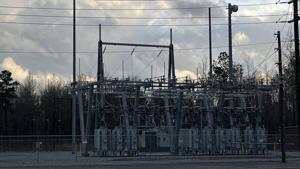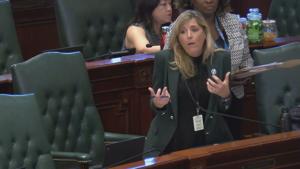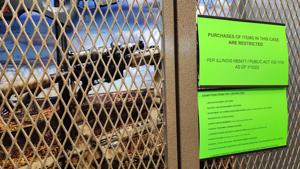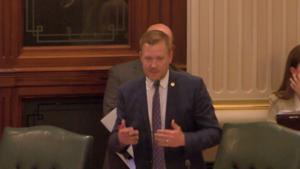
Net negative migration is harmful to the economy, economists say
Though the economy and immigration were issues that helped President Donald Trump secure the White House, some economists have said that too steep a decline in immigration will prove harmful to the economy.
The Trump administration touted a statistic Monday reported by CNN the day before: The U.S. may see negative net migration in 2025, meaning more people will leave the country than move there. However, economists from both right- and left-leaning policy centers warn that too little immigration drags down GDP growth.
The center-right American Enterprise Institute recently authored a report with the center-left Brookings Institution projecting net migration would land between -525,000 and 115,000 in 2025, but with “zero or net negative migration” being the more likely outcome.
The report considered the president’s deportation efforts, as well as his broader immigration policy, predicting lower legal permanent resident entries than in his first term and factoring in greater vetting for temporary visas, a suspended refugee program, travel bans and terminated humanitarian parole programs.
“All told, given changes at the border and the regular migration system, we expect 2.47 million to 2.76 million fewer people to come to the U.S in 2025 than in 2024,” they wrote. And later, that they “expect around 675,000 to 1,020,000” more immigrants to leave the country than last year.
They project these changes will reduce GDP growth by 0.3-0.4 percentage points.
Chief Economist for the Center on Budget and Policy Priorities Gbenga Ajilore wasn’t surprised by the report’s findings.
“While think tanks may have different ideologies, there are basic facts that a majority of economists believe in, and one is that immigration has a net positive impact on our economy and our communities,” Ajilore said in an email to The Center Square.
Lower immigration means a smaller labor pool – which one might think translates to less people competing for the same amount of jobs, meaning more employment among American citizens. However, it actually means less jobs overall, according to David Bier, director of immigration studies at the libertarian Cato Institute.
“Yes, there are fewer competitors for jobs, but because there are fewer people requesting services and goods in society, then there’s a comparable shrinking in the number of jobs for U.S.-born workers as well,” Bier told The Center Square in an interview.
Giovanni Peri, a professor in international economics at the University of California, Davis, and the founder of the school’s research center on migration policy, along with a colleague, has studied some of the same data that was covered in the AEI-Brookings report. The report anticipates, as does Peri, some of the other negative economic impacts that can result from a smaller labor force.
“We do not expect natives to take [jobs held by immigrants] as the labor market is already tight, especially in manual services… and the native labor force is shrinking,” Peri wrote in an email to The Center Square. “As a consequence, prices in those services will increase.”
For these reasons, in addition to the loss of some highly skilled workers and lower investments, according to Peri, Peri and Georgetown Professor of Economics Anna Maria Mayda predicted an even greater impact on GDP growth of -0.7%.
Director of Immigration Law and Policy Research at the Economic Policy Institute Daniel Costa doubts that net migration will be negative in 2025 but thinks it will be soon.
“I am skeptical that we will see negative net migration in the first year, just based on some of the legal immigration flows… which might take longer for the administration to impact,” Costa told The Center Square. “But I do think we will likely see it in the next years of the administration, especially after the major influx of $170 billion the administration has been gifted from Congress for immigration enforcement.”
The AEI-Brookings report authors believe net migration will start to recover some in 2027 and 2028, “as the adverse economic and political consequences of extreme policy stance become clear.” Bier was less optimistic.
“I wouldn’t think that because we have so much money going into ICE and Border Patrol and almost none of it has been spent at this point,” Bier said. “I think it’s more likely that you’re going to see an escalation over four years.”
Latest News Stories

WATCH: Pritzker blames Trump for budget cut EO; Chicago public safety on Trump’s mind

Louisiana joins four states in complaint against electricity grid operator

Illinois quick hits: State rep. appointed circuit judge; Bailey to seek rematch with Pritzker

WATCH: IL governor on photo with wanted suspect: ‘No way to vet everybody’

Illinois quick hits: Constitutional amendment would guarantee parental rights

WATCH: Republican leader: says Pritzker budget cut EO a ploy for IL tax increases

Judge’s questions during IL gun ban arguments gives rights advocates ‘hope’

Illinois agencies to post monthly investment reports, lawmaker calls symbolic

Meeting Summary and Briefs: Summit Hill School District 161 for August 13, 2025

Summit Hill 161 Accepts a Dozen Resignations, Approves New Hires

Summit Hill 161 Approves $48K Tech Upgrade, Board Divided on New Teacher Hire

Meeting Summary and Briefs: Frankfort Village Board for September 8, 2025

